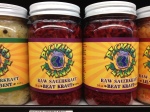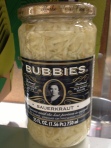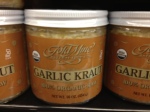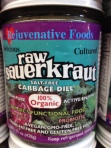By Carole Bartolotto, MA, RD
Antibiotics were a miraculous discovery, saving lives because of their ability to kill bacteria. Thanks to antibiotics, diseases such as tuberculosis, typhoid fever, diphtheria, and leprosy are treatable and not a problem for most people. However, there is a downside to antibiotics, and one that I experienced firsthand after taking them for 7 years at the advice of my physician. When you take antibiotics, they destroy both bad and good bacteria.
Collectively, the bacteria in our gut or gastrointestinal (GI) tract are called the microbiome or the microbiota. These good bacteria are necessary for our health. They help us fight infection by crowding out unhealthy bacteria. We also need bacteria to help us digest food. And they decrease our risk of allergies, asthma, and inflammatory bowel disease. Without these healthy bacteria, we would not survive.
By the age of 18, the average person has taken 10 to 20 courses of antibiotics. And with each course of antibiotics, we lose more of the good bugs.
Taking antibiotics only when really necessary is an important step in preserving the good bacteria in your microbiome. Adding back healthy bacteria is another important step you can take. The best and most reliable sources are fermented foods. This includes high-quality yogurt with live cultures, kefir, and fermented veggies. Since I can’t eat dairy, I have been eating fermented veggies and have to say that I love them!
When looking for fermented vegetables, make sure they contain live cultures. You will find them in the refrigerated section of the market. Below are a few I have found.
Bubbies sauerkraut is easier to find and it does have live cultures.
Gold Mine sauerkraut is available at some Whole Foods Markets and independent health food stores.
There are even salt free options!
 I found the Pickled Planet brand at the Co-Op in Santa Monica. I tried their sauerkraut made with beets and caraway seeds and it was delicious. Check independent health food stores near you to see if they carry this or other brands.
I found the Pickled Planet brand at the Co-Op in Santa Monica. I tried their sauerkraut made with beets and caraway seeds and it was delicious. Check independent health food stores near you to see if they carry this or other brands.
I even found fermented pickles and salsa! And there is always kimchi, Korean-style fermented vegetables with a spicy kick. You can even make your own fermented veggies at home.
There are so many options to choose. All are a lot more interesting than a probiotic supplement. Do you have any favorite fermented veggies? I would love to know which brands you like or what you are willing to try.
Copyright © 2013 Carole Bartolotto, MA, RD. All rights reserved.




http://www.culturedpickleshop.com/products.html#
I like this shop in Berkeley — they have a vast variety from which to choose.
Thanks T! I wish there was a store like that in the Los Angeles area. I will see what I can find.
Carole. I would like to thank.you for trying to expose the unethical connections with Monsant. I too am an RD, and have on several occations emailed AND requesting info r/t GMo’s and voicing my concerns over the health consequences of these substances. No Reply is all I received. They just ignored me, not even so much as a form letter blowing me off (which I expexted). I let my membership with AND lapse. I cannot affiliate mtself with an organiztion that treats GMO’s as a non-issue, and touts pepsi products as OK. I educate my patients everyday on the dangers of these items, and will continue to do so. Keep up the good fight Carole, it’s worth it!
Thanks Tricia!
Btw, the previous post was intended for your article about getting kicked off the work group. For some reason it posted the reply for this article, doh!
Can one eat fermented foods while taking antibiotics? Will it be okay?
Yes, it would be best to eat the fermented veggies hours apart from the antibiotics though.
I was just on the point of creating a post about sauerkraut (back in the day and the place we (my mom) was making two 250 liters barrels of sauerkraut each fall, and it lasted through the winter and part of spring: delicious, in sarmale (sauerkraut leaves rolls, with meat, and rice), and so on. I guess the real health benefits though, were not as much advertized, but then there was little acknowledgement of the pre-and probiotics, and their irreplaceable role in the human body digestive system…We were more or less eating what our grandparents were, my parents and I: borsch (homemade by a moldovan refuge), and yogurt, with not implements like fruits, just the real thing, and kefir, and all sorts of pickled cucumbers, stuffed peppers, with sauerkraut, etc, etc. I am sure that kept the glucose levels down, in the body, being beneficial in diabetes. I may be right, but just from the point of view of a better, faster digestion it makes sense to include natural probiotics in the daily food intake.
I will make reference to your post, am glad to have find your website, and if not an imposition, I will follow!
Thanks,
George.
Thanks George! I would love to know how you ferment cabbage. It’s on my list of must do things!
We boil water while adding salt to it then poor the water over the cabbage (thinly cut and compacted). I like to put several horseradish root, cut as little wedges, Pencil size, and dry dill plant stems. Also few garlic cloves.
For the red cabbage we just add vinegar (like to use tarragon) too (few branches of fresh tarragon).
For larger quantities: we carve out the heart of the cabbage (small and compact) and pour salt inside, and set them with the that side up, we fit as many as possible. We add the garlic cloves, in between, and then add the salty boiling water, the horseradish and dry dill (trunks) go on top, we then put some nicely carved light wool sticks on top and a clean rock on the upper top to keep the cabbage pressed, and cover the container with tick cloth. Kept like such in the dry dark, cool cellar the cabbage is just ready to dice, or served as whole leaves. Yummy! The juice is a very potent cleanser, some people really drink it for health…Please let me know if you need more clarification!
On another subject: I am lucky to have closed to the place where I live a bakery, that makes natural bread: I don’t know what I would do without that, as I can’t touch the bread offered by the industrial food manufacturers (how did it all come to this, is beyond my understanding)
Thanks!
My pleasure!
keep in touch!
good luck with the cabbage: I recommend a water cooler jar, with a cut neck about half way to enlarge its mouth
Okay sounds good. PS. I know what you mean about our food, I can’t believe what has happened to it. It is almost unidentifiable! I want to try fermenting my own cabbage but I have to wait until June. I am teaching a class at a university (the textbook is quite interesting) and I have a lot of work to do, in addition to my full time job. Thanks for the info.
My pleasure!
Good article! Want to chip in that it’s so easy to make one’s own fermented vegetable dishes, just google away. Easy, cheap, satisfying, healthy…